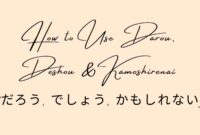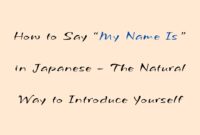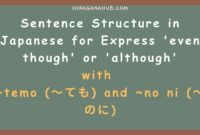Japanese Grammar “Kara” (〜から) for Explaining Cause and Effect
The Japanese language has many sentence patterns to explain the relationship
between cause and effect. One commonly used pattern is the use of “kara”
(から). In this article, we will discuss how “kara” is used to express the
reason or cause of a statement. Additionally, we will look at some example
sentences to better understand its usage.
What is “Kara”?
In the context of cause and effect, “kara” means “because” or “since.” This
pattern is used to indicate the reason for the statement that follows. The
part placed before “kara” is the reason or cause, while the statement after
“kara” is the result or effect of that reason.
The basic structure is as follows:
[Reason/Cause] + から + [Result/Effect]
For example:
-
さむいから ふといものをきます。 (samui kara futoi mono o kimasu): Because it’s cold, I wear thick clothes.

Example Sentences with “Kara”
To help understand this pattern, here are some example sentences with
explanations:
-
さむいから ふといものをきます。
(Samui kara futoi mono o kimasu): Because it’s cold, I wear thick clothes. -
やくそくがあるから パーティーにいきません。
(Yakusoku ga aru kara paatii ni ikimasen): Because I have an appointment, I won’t go to the party. -
まだねていないから べんきょうにしゅうちゅうできません。
(Mada nete inai kara benkyou ni shuuchuu dekimasen):
Because I haven’t slept yet, I can’t focus on studying. -
あめがふっているから ばしょでうんどうをしない。
(Ame ga futteiru kara basho de undou o shinai): Because it’s raining, I won’t play in the field.
Vocabulary List from Example Sentences
Here is a vocabulary list used in the examples above:
| Kanji | Hiragana | Romaji | Meaning |
|---|---|---|---|
| 寒い | さむい | samui | cold |
| 混たもの | ふといもの | futoi mono | thick clothes |
| 着ます | きます | kimasu | wear |
| 約束 | やくそく | yakusoku | appointment |
| パーティー | パーティー | paatii | party |
| 行きません | いきません | ikimasen | won’t go |
| まだ | まだ | mada | not yet |
| 寝ていない | ねていない | nete inai | haven’t slept |
| 勉強 | べんきょう | benkyou | study |
| 集中 | しゅうちゅう | shuuchuu | focus |
| 雨 | あめ | ame | rain |
| 降っている | ふっている | futteiru | falling (rain/snow) |
| 場所 | ばしょ | basho | place |
| 運動 | うんどう | undou | exercise |
Usage Tips
-
Use “kara” with clear and direct reasons. This pattern is very commonly
used in daily conversations. -
“Kara” can also be used with verbs, adjectives, and nouns. Make sure the
sentence structure is correct. -
This pattern is different from “node” (ので), which also means “because”
but is more formal. Choose according to the context.
Conclusion
Using “kara” in Japanese sentences is an effective way to explain cause and
effect. By understanding this pattern, you can significantly improve your
communication skills in Japanese. Don’t forget to keep practicing creating new
sentences to get more familiar with it! If you want to learn more about
Japanese, visit online platforms that provide free materials for everyone.
Happy learning and good luck! がんばってください (Ganbatte kudasai).


